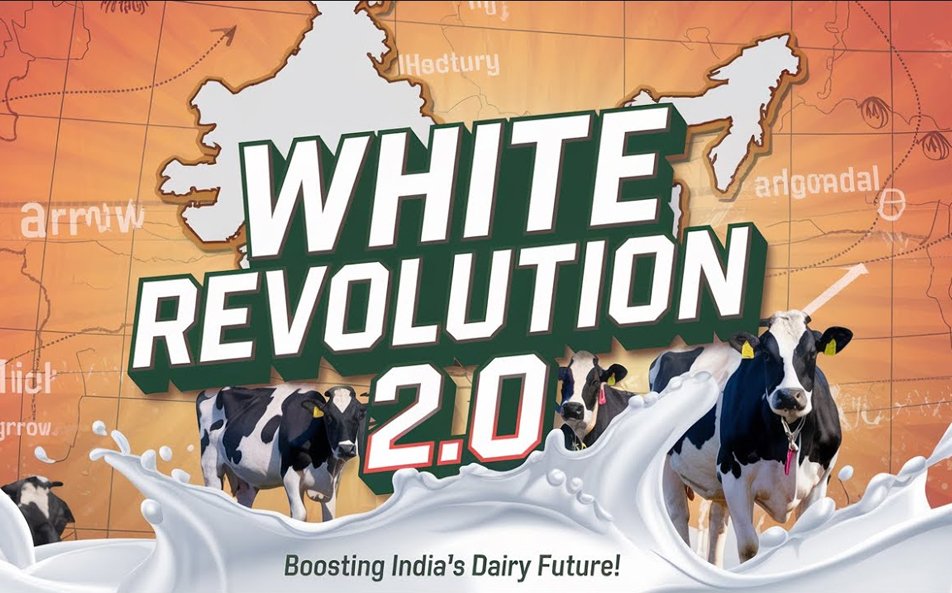
Dr. Bhumit A. Shah.
B.Com, M.Com, GSET Commerce, MBA, GSET Management, ICCC Level – 01, and Ph.D.)
Assistant Professor,
Department of Cooperative Management and Rural Studies. Faculty of Commerce,
The Maharaja Sayajirao University of Baroda, Vadodara, Gujarat, India
Email id: bhumit.shah333@gmail.com
Email id: bhumit.shah-cmr@msubaroda.ac.in

Mr. Chirag N. Bareja
Faculty Member,
Department of Cooperative Management and Rural Studies. Faculty of Commerce,
The Maharaja Sayajirao University of Baroda, Vadodara, Gujarat, India
Email id: barejachirag@gmail.com
Email id: chirag.b-cmr@msubaroda.ac.in
White Revolution 2.0 is an initiative to further develop India’s dairy industry, building on the success of the original Operation Flood program from the 1970s. The new phase, launched on September 19, 2024, aims to boost milk production, empower women farmers, and improve dairy infrastructure through the use of innovative technology, digitalization, and sustainable development practices. A key objective is to increase milk procurement by dairy cooperative societies by 50%, from 660 lakh liters per day to 1,000 lakh liters per day, over the next five years. This will be achieved through a two-pronged strategy of expanding the reach and coverage of dairy cooperatives.
The article highlights the crucial role of dairy cooperatives in supporting farmers with organized milk marketing, veterinary services, and feed supplies, which improves resource efficiency. White Revolution 2.0 is designed to address current challenges in the dairy sector, such as low milk yield, slow growth rates, and price instability for farmers. The initiative also seeks to tackle concerns related to milk quality and safety, the need for greater empowerment of women in the dairy sector, and the untapped potential for dairy exports. To achieve its goals, the program will focus on enhancing productivity through advanced breeding and feed management, ensuring fair prices for farmers, and improving infrastructure for milk collection and processing.
The Article outlines several key linkages between White Revolution 2.0 and the sustainable development of rural India (“Gramin Bharat”). These include generating stable income for rural households, empowering women farmers by increasing their participation in the dairy sector, and creating employment opportunities for rural youth. The initiative is also expected to increase dairy exports, allowing rural producers to access global markets and boosting the country’s income. The successful implementation of White Revolution 2.0, with support from the Ministry of Cooperation, RBI, and NABARD, is considered central to the vision of a “Viksit Bharat@2047” (Developed India by 2047). To provide the necessary skilled manpower and leadership for this initiative, the Government has established Tribhuvan Sahkari University (TSU), India’s first cooperative-only university, which will train professionals and foster research in the cooperative sector.
Key Association between Dairy Cooperatives and Vision Viksit Bharat@2047:

Source: Developed from Review of literature
The key association between Dairy Cooperatives and Vision Viksit Bharat@2047 given in above figure. The framework showed in aabove figure outlines key associations for the Sustainable Development of Dairy Cooperative Movement in India, driven by collaboration between Ministry of Cooperation and Credit Cooperative Banks and Societies. The Ministry of Cooperation, taking cooperative and development measures to boost the cooperative movement in India from 2021 and develop the agriculture and dairy sector with the help of White Revolution 2.0 and MPACS, will cover all the milk producing villages of India with dairy cooperatives and strengthen the dairy cooperatives already operating in rural areas.
White Revolution 2.0 aims to increase milk production, increase the income of milk producing farmers, empower women associated with milk production, and increase the export of dairy producers. This figure shows that RBI and NABARD play a vital financial role in this ecosystem through cooperative banks and societies including SCBs, DCCBs, and PACS, which include a three tier structure of cooperative credit, will provide credit and fund support to the dairy cooperative societies, which can move forward on the path of sustainable development of cooperative movement. Collaboration with the Ministry of Cooperation and financial institutions (RBI and NABARD) is important for the sustainable development of the dairy
sector. While the Ministry formulates important policies and reforms for the dairy sector, RBI and NABARD will ensure strong financial facilities for its implementation with the help of cooperatives. This model also shows the one of the principles of Cooperation given by International Cooperative Alliance (ICA) that is “Cooperation among Cooperatives” which shows the achievement of Sustainable Development Goals (SDGs) as well as the vision of our Honourable Prime Minister of Bharat Shree Narendra Modiji’s Vision Viksit Bharat@2047 through dairy sector.
Model for Role of Cooperative University to Strengthen Dairy Sector:

Source: Developed from Review of literature
Model for Role of Cooperative University to Strengthen Dairy Sector are given under above. Tribhuvan Sahakari University, in the dairy sector, play a vital role in providing skilled manpower and cooperative leadership which strengthen the cooperative movement. This university provide specialized knowledge and skills for rural management, which are essential for the smooth functioning of dairy cooperatives. They provide comprehensive training on cooperative principles, business practices and modern technologies to farmers, cooperative workers and managers. Through these training programmes, university produce skilled manpower tailored to local needs, which helps in making dairy cooperatives more efficient and sustainable. By blending modern education with cooperative values, cooperative university produce leaders and professionals who possess not only a business vision, but also a cooperative spirit and social responsibility. This approach ensures that dairy cooperatives work not only economically but also for the welfare of their members and the development of the community. Individuals equipped with such education are able to bring innovation and reforms in the cooperative sector, which makes the dairy cooperative movement more dynamic and progressive. They are able to face challenges and take advantage of opportunities, thereby strengthening the entire cooperative structure. In addition, cooperative university promote research in the cooperative sector, especially in the dairy industry. In this way, cooperative
universities continuously strengthen the dairy cooperative movement not only through education and training, but also through research and development, and effectively bridge the gap in manpower and leadership. The Government of India has made a declaration to set up Tribhuvan Sahkari University (TSU), the nation’s first stand-alone university for cooperative education. Consequently, there will be fresh blood infused in the cooperative movement with young, dynamic professionals from TSU. India will have a new cooperative imbued with the spirit of cooperation and with modern education. Tribhuvan Sahkari University will not be merely another educational institution but a movement to make sure that India’s cooperative sector develops further by leaps and bounds. Implementation of the TSU Act could not have come at a better time as it is not only the UN International Year of Cooperatives but more significantly, we are setting out on the path of establishing Sustainable Dairy Cooperatives in the uncovered panchayats and villages and consolidating the existing Dairy Cooperatives Societies in the country in the next five years ushering in White Revolution 2.0 under the aegis of the Ministry of Cooperation. TSU setup will Augment our efforts and provide necessary manpower support for the success of White Revolution 2.0. It will in fact make the dream of “Shakar-se-Samridhi” a reality for India. TSU is poised to become a global benchmark for cooperative education energizing and reviving the cooperative movement, driving India’s next step of rural prosperity and making India a developed nation by 2047.
White Revolution 2.0 is central to sustainable development of dairy cooperatives and a key factor of Viksit Bharat@2047, a national vision with the potential to transform Indian economy. The implementation of White Revolution 2.0 in India will increase milk production, increase the income of milk producing farmers, strengthen the rural economy based on agriculture and animal husbandry, empower women and increase foreign exports. The collaboration between White Revolution 2.0 and MPACS by the Ministry of Cooperation will cover rural areas of India with dairy cooperatives and strengthen and enable dairy cooperatives in areas where dairy cooperatives are already exists. In which RBI and NABARD will provide adequate funds and financial assistance with the help of cooperative credit banks and societies. Thus, the collaborative efforts of the Ministry of Cooperation and financial institutions (RBI and NABRD) will lead to sustainable development of the dairy sector of Bharat, which is leads the vision of Viksit Bharat@2047. Similarly, the Government of India has established a Cooperative University to strengthen the dairy cooperatives. The Cooperative University will provide the necessary human resources, cooperative training and education, research and innovation to the dairy cooperatives. This will fulfill the promise of “Shakar-se-Samridhi”. White Revolution 2.0 will prove to be a game changer in the future of the dairy sector in Bharat.






